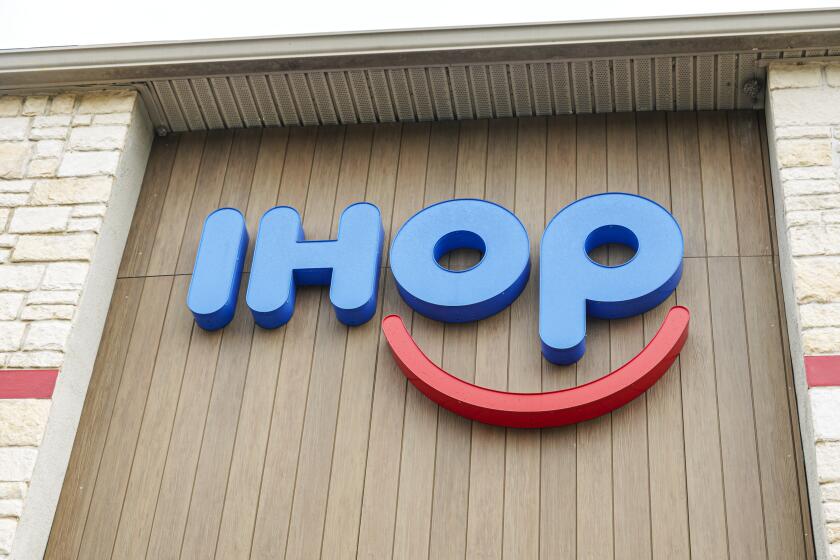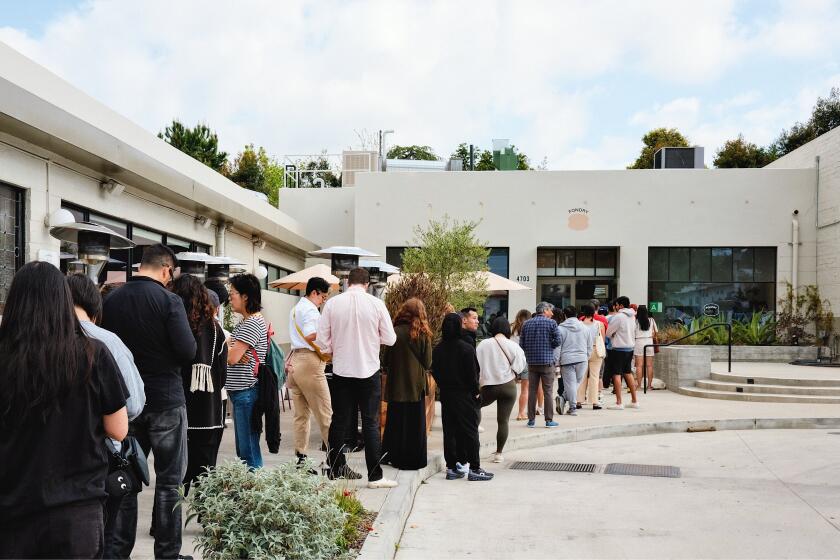How They Got Cooking Cooking
To cook or not to cook? In every chef’s life, there’s a turning point, a moment of decision, of clarity and vision--after which most of one’s time is devoted to the kitchen. We asked 14 of Southern California’s best chefs when and how that defining moment occurred in their lives. Here is what they said:
*
Andre Lechien, chef at Book Soup Bistro, West Hollywood
“In France, I had no idea what I was going to do, but my mother wanted me to be a jeweler. I studied at Van Cleef & Arpels. And I was so bored! I just sat all day with the big loupe in my eye. Such a headache! My mother didn’t cook. Nobody cooked at home. But I got it into my head that I might like cooking. So I went to cooking school for four years. My first year, I was very bad with the writing and studying. But I had a teacher who saw I had something. He told me to work two months here and there, in different restaurants, and to learn as much as I could. Once I graduated and started working, I saw that I loved to cook, and I still do: It’s just creating, creating, creating.”
*
Patrick Healy, executive chef at Xiomara, Pasadena, and the Buffalo Club, Santa Monica
“I grew up around good food. My grandmother took cooking classes with--not from--Julia Child, who was her good friend. The summer after I graduated from high school in 1975, I traveled around Europe. I went to visit my grandmother, and we all went out to eat at Roger Verge’s [then-three-star] Le Moulin de Mougins--my grandmother, my sister, Julia Child and her husband. Verge came out to greet us, and he could have been a chef from Central Casting: tall, elegant, refined, gracious. He was wonderful with people, which a lot of chefs aren’t. At dinner, they slaved over us. I had never eaten food at that level. Then Verge showed me the kitchen. He had about 25 people in there, and everything was spotless. It all looked good to me. The kitchen. The food. The opportunity to get to know so many people. Two years went by before I started cooking, and a few years after that, I was working as a chef in Verge’s kitchen.”
*
Suzanne Tracht, chef at Jozu, Los Angeles
“I started out working in the stewarding department at the Arizona Biltmore, a very European five-star hotel. There were no women stewards, and nobody knew what to do with me. So I went into the ‘dish room’--washing dishes. All along I knew that I wanted to be in the kitchen. I wanted to wear one of those hats. So I kept knocking on the chef’s door and asking, ‘Can I come work in the kitchen?’ He was a hard-nosed German chef, and one day he just told me: ‘I don’t like to take women into apprenticeship. They get married and have children and leave, and I have wasted my time.’ Well, I was young and thought I could conquer everything. Instead of discouraging me, his words cemented my ambition. I kept knocking, he finally let me in and I completed his three-year apprenticeship.”
*
Michael McCarty, owner of Michael’s, Santa Monica
“My parents used to entertain. They had wonderful friends who loved to have fun together. The quality of food and wine my parents served was always impeccable, but that was a time when nobody discussed food and wine. I grew up in New York State, observing these great good times. When I was 15, I went to school in Brittany. The night before I sailed, my father took me to [the French restaurant] L’Aurent in Manhattan. The dining room had mahogany, beveled glass and mirrors, white linen and fine china. It looked like a million bucks. Then the owner walked in, and the electricity in the room just ratcheted up. A few minutes later, the bill came, and my father and his friend argued over it. That’s when it all came together for me: This could be a business! In Europe, I discovered an entire school system devoted to the restaurant business and later took advantage of it, enrolling in the Cordon Bleu and the Wine Academy. It was that or studying at McGill University in Canada.”
*
Gilles Epie, chef-owner of Chez Helene, Beverly Hills
“I decided to become a chef when I was 8. I started cooking with my mom, mostly cakes and fish. I was not a good student at school, and when my parents asked me why I was so bad, I told them it was because I wanted to be a chef and go to work. And so I did. I went to work at 14 with Roger Galoux at Paul Bocuse’s restaurant in Nantes. He taught me everything. I learned discipline, to be serious in my work, because it’s not a game.”
*
Susan Campoy, chef-owner of Julienne, San Marino
“In the late ‘70s and early ‘80s, I entertained a lot, and I took cooking classes at [the school] La Cuisine at Ma Maison with Joachim Splichal and Michael Roberts. Then I went through a divorce. I needed a way to support my four children, and though I was teaching at the time, I kept thinking: ‘Wouldn’t it be wonderful to cook?’ I stopped by . . . [a prominent French restaurant] one day to apply for a job making pastries. I made my way into the kitchen and was watching a pastry chef work when the owner came in and yelled at me: ‘You are an American and a woman! You cannot be in my kitchen!’ I knew then I’d have to go into business on my own. My dad had been in the restaurant business--he owned the Jolly Cafe on 1st Street in Los Angeles. Still, it was scary as hell to make the leap. But with the support of friends, I started catering out of my home. Then I went to Paris with some investors and we went to a perfect little bistro called Julien. That’s what led me to open my own brasserie and takeout shop 12 years ago.”
*
Michael Roberts, chef and co-owner of Twin Palms, Pasadena and Newport Beach
“I was in college, studying music theory and composition. I imagined myself 30 years hence as a wonderful composer, bursting with melodies that I had to get out of my tortured mind to give to the world. Then, one night when I was cooking dinner, I realized I didn’t have any melodies. The simplest compositional exercise, melody or four-part fugue left me completely frustrated. In that moment, I thought: ‘Why do I sit at the piano daydreaming and getting frustrated? In the kitchen, I touch and smell things and learn,’ and then it hit me. ‘This is what I should be doing.’ ”
*
Mary Sue Milliken, chef and co-owner of Border Grill, Santa Monica
“When I was 16, I met a friend of my sister’s, Greg Duda. Greg had gone to chef school and owned bakeries in Chicago. He invited us over for dinner and I remember everything about it. He made a shrimp appetizer and chicken paprikash in about 45 minutes. He had so much passion for food, and I thought: ‘I want to become a chef.’ It was really an immediate reaction. I graduated from high school in three years instead of four, moved to Chicago and worked for a year at Let Them Eat Cake, one of Greg’s bakeries, while I was waiting to get into chef school at Washburn Trade School.”
*
Raphael Lunetta and Josiah Citrin, chefs and co-owners of JiRaffe, Santa Monica
“We’ve been friends since the third grade. Even when we were young, we spent a lot of money on food and eating out. When you’re 12, 13 years old, a meal in a Thai restaurant is a big deal. We’d go surf, and after that we’d go eat. We started joking around about opening our own restaurant together. It was a dream. The years passed. One of us [Josiah] moved to France and, a year later, the other [Raphael] joined him. When we came back, we worked with [Joachim] Splichal at Patina together, and at Capri, and at Jackson’s and Jackson’s Farm. Two years ago, Raphael gave notice. He wanted to do something on his own. We told each other: Let’s go for it. We raised the money--two kids from Venice who didn’t come from any money--and six months later, we opened JiRaffe. It can be done.”
*
Claud Beltran, chef at Dickenson West, Pasadena
“On my 11th birthday, my parents took me to [the now-defunct French restaurant] Marianne’s in Pasadena for dinner. There, the chef’s sister came to the table with a chalkboard and explained the entire meal, step by step. That people could be so interested in food was a revelation. The food itself was remarkable. And the service was wonderful. We sat in one of those cubbyholes where, knowing him, my father probably snuck me a glass of wine. The whole experience really sparked my interest in food. I started playing around in the kitchen at home. Ten, 11 years later, when I was unhappily employed [as a research and development technician] in the aerospace business, I was still playing around in the kitchen and thought maybe I should try cooking for a living.”
*
Josie Le Balch, chef at Saddle Peak Lodge, Calabasas
“My father was a chef. He had a cooking school out of his [French continental] restaurant, Chef Gregoire, in Sherman Oaks. There were always a lot of people hanging around the school--well, a lot of bored housewives trying to flirt with my father. I started working in the restaurant when I was 14 and wasn’t very happy about it. But one day, when I was 16 or so, a woman apprenticing at the school told me how lucky I was to get all this training for free. That woke me up. Instead of resenting having to work in the family business, I began to appreciate where I was, to see it with a different set of eyes.”
*
Fred Eric, chef-owner of Vida, Los Feliz
“I was in Michigan, training in French biodynamic farming. All the people there had a mission to create the purest, best-tasting produce. I loved the intensity and the community and sense of mission, but nobody knew how to cook what we grew. I focused on trying to do things with all that food, imagining how great it would be to make a Chinese bao or a Vietnamese spring roll. Yet it also seemed like a total mystery. Finally, my teacher at the farm, Alan York, told me that I had way too much energy and enthusiasm to be farming and that I should be cooking. It was just the thing I needed to hear. I came straight home to Los Angeles, to Giuseppe’s, then to study with Claude Segal just as Ma Maison was closing and then to Bistango with him. After that, I studied in France and Japan.”
*
Neela Paniz, chef and co-owner of Bombay Cafe, West Los Angeles
“I’m not sure there was one moment. It was more like many nagging moments. Every time I made a meal for my husband, children or friends, it came up: You should really have your own restaurant. I was working in the loan department of a bank. I hated the loan department. The day I quit, I knew I wasn’t ever going back--the drudgery of a 9-to-5 job was intolerable--nor was I going to sit at home and do nothing. I’d known all along what I really wanted to do. Two years later, I opened Chutneys, which served Indian fast food.”
More to Read
Eat your way across L.A.
Get our weekly Tasting Notes newsletter for reviews, news and more.
You may occasionally receive promotional content from the Los Angeles Times.






